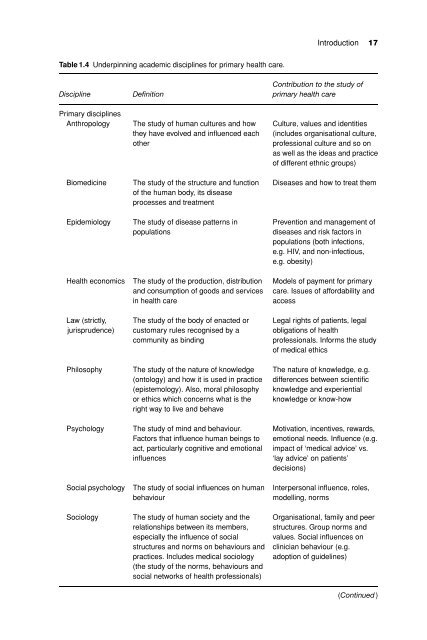- Page 1: Primary Health Care THEORY AND PRAC
- Page 4 and 5: To my students, who expected me to
- Page 6 and 7: C○ 2007 Trisha Greenhalgh Publish
- Page 8 and 9: vi Contents 5 The primary care clin
- Page 11: Acknowledgements This book is my ow
- Page 14 and 15: xii Preface foremost, I have delibe
- Page 16 and 17: xiv Preface 2 Thinking practitioner
- Page 19 and 20: Foreword In 1974, as a working GP i
- Page 21: Foreword xix But here we reach my s
- Page 24 and 25: 2 Chapter 1 USA) provides specialis
- Page 26 and 27: 4 Chapter 1 single-handed GPs (‘o
- Page 28 and 29: 6 Chapter 1 irrespective of the pat
- Page 30 and 31: 8 Chapter 1 Standardisation of clin
- Page 32 and 33: 10 Chapter 1 Table 1.1 Trends in th
- Page 34 and 35: 12 Chapter 1 proportion of people w
- Page 36 and 37: 14 Chapter 1 contemporary academic
- Page 40 and 41: 18 Chapter 1 Table 1.4 (Continued )
- Page 42 and 43: 20 Chapter 1 Mrs Perkins has a diff
- Page 44 and 45: 22 Chapter 1 8 Campbell JL, Ramsay
- Page 46 and 47: 24 Chapter 2 2.1 Biomedical science
- Page 48 and 49: 26 Chapter 2 chapter offer the prin
- Page 50 and 51: 28 Chapter 2 sentence ever printed
- Page 52 and 53: 30 Chapter 2 patient than ‘it mig
- Page 54 and 55: 32 Chapter 2 2.3 Psychology 2.3.1 O
- Page 56 and 57: 34 Chapter 2 psychologists (who con
- Page 58 and 59: 36 Chapter 2 The professional role
- Page 60 and 61: 38 Chapter 2 academics to address p
- Page 62 and 63: 40 Chapter 2 of it to be therefore
- Page 64 and 65: 42 Chapter 2 The ‘narrative turn
- Page 66 and 67: 44 Chapter 2 logical analysis will
- Page 68 and 69: 46 Chapter 2 holding an extreme pos
- Page 70 and 71: 48 Chapter 2 expensive healthcare r
- Page 72 and 73: 50 Chapter 2 on inductive logic bec
- Page 74 and 75: 52 Chapter 2 Vicarious reinforceme
- Page 76 and 77: 54 Chapter 2 problem solving and th
- Page 78 and 79: 56 Chapter 2 25 Russell B. History
- Page 80 and 81: 58 Chapter 3 (Summary points contin
- Page 82 and 83: 60 Chapter 3 Table 3.1 Examples of
- Page 84 and 85: 62 Chapter 3 Box 3.2 Fraud and misc
- Page 86 and 87: 64 Chapter 3 to answer the question
- Page 88 and 89:
66 Chapter 3 Exploratory (hypothesi
- Page 90 and 91:
68 Chapter 3 Exposed cohort (diseas
- Page 92 and 93:
70 Chapter 3 Therapy questions tak
- Page 94 and 95:
72 Chapter 3 3.4 Questionnaire rese
- Page 96 and 97:
74 Chapter 3 a reliable questionnai
- Page 98 and 99:
76 Chapter 3 Box 3.4 Principles of
- Page 100 and 101:
78 Chapter 3 questions in health ca
- Page 102 and 103:
80 Chapter 3 on the physical surrou
- Page 104 and 105:
82 Chapter 3 Bias can be defined as
- Page 106 and 107:
84 Chapter 3 Range of values compat
- Page 108 and 109:
86 Chapter 3 According to Stokols,
- Page 110 and 111:
88 Chapter 3 23 Adams AS, Soumerai
- Page 112 and 113:
CHAPTER 4 The person who is ill Sum
- Page 114 and 115:
92 Chapter 4 Table 4.1 The sick rol
- Page 116 and 117:
94 Chapter 4 person was faced with:
- Page 118 and 119:
96 Chapter 4 TG What then? Just lif
- Page 120 and 121:
98 Chapter 4 I have, somewhat unusu
- Page 122 and 123:
100 Chapter 4 Table 4.3 The stages
- Page 124 and 125:
102 Chapter 4 addicts in sexual enc
- Page 126 and 127:
104 Chapter 4 to prevailing policy
- Page 128 and 129:
106 Chapter 4 from peers is a parti
- Page 130 and 131:
108 Chapter 4 4.5 Health literacy W
- Page 132 and 133:
110 Chapter 4 and unimaginative ran
- Page 134 and 135:
112 Chapter 4 27 Conner M, Kirk SF,
- Page 136 and 137:
114 Chapter 4 69 Rogers ES, Wallace
- Page 138 and 139:
116 Chapter 5 (Summary points conti
- Page 140 and 141:
118 Chapter 5 matters - to help gen
- Page 142 and 143:
120 Chapter 5 practitioners, for ex
- Page 144 and 145:
122 Chapter 5 Box 5.2 shows how epi
- Page 146 and 147:
124 Chapter 5 are generally expensi
- Page 148 and 149:
126 Chapter 5 the one I first heard
- Page 150 and 151:
128 Chapter 5 watching, and listeni
- Page 152 and 153:
130 Chapter 5 argued in the previou
- Page 154 and 155:
132 Chapter 5 Box 5.4 The six inter
- Page 156 and 157:
134 Chapter 5 cost-neutral (so may
- Page 158 and 159:
136 Chapter 5 PROCESS OF ADOPTION A
- Page 160 and 161:
138 Chapter 5 Box 5.5 Bad clinician
- Page 162 and 163:
140 Chapter 5 to - clinical governa
- Page 164 and 165:
142 Chapter 5 23 Liu JL, Wyatt JC,
- Page 166 and 167:
144 Chapter 5 67 Freemantle N, Harv
- Page 168 and 169:
CHAPTER 6 The clinical interaction
- Page 170 and 171:
148 Chapter 6 Box 6.1 Examples of c
- Page 172 and 173:
150 Chapter 6 Table 6.1 Examples of
- Page 174 and 175:
152 Chapter 6 theory and developed
- Page 176 and 177:
154 Chapter 6 flunked a test, I mig
- Page 178 and 179:
156 Chapter 6 A characteristic of c
- Page 180 and 181:
158 Chapter 6 that had been exhibit
- Page 182 and 183:
160 Chapter 6 often those with chro
- Page 184 and 185:
162 Chapter 6 which doctors are enc
- Page 186 and 187:
164 Chapter 6 listening was what se
- Page 188 and 189:
Table 6.2 Different research tradit
- Page 190 and 191:
Table 6.2 (Continued ) Quality in t
- Page 192 and 193:
170 Chapter 6 An interesting findin
- Page 194 and 195:
172 Chapter 6 30 Sandvik M, Eide H,
- Page 196 and 197:
174 Chapter 6 81 Jacobs EA, Shepard
- Page 198 and 199:
176 Chapter 7 (Summary points conti
- Page 200 and 201:
178 Chapter 7 and worked out how to
- Page 202 and 203:
180 Chapter 7 of population statist
- Page 204 and 205:
182 Chapter 7 seen in China over th
- Page 206 and 207:
Table 7.2 Cultural evolution and th
- Page 208 and 209:
186 Chapter 7 children of mothers w
- Page 210 and 211:
188 Chapter 7 infant initially know
- Page 212 and 213:
190 Chapter 7 in subsequent generat
- Page 214 and 215:
192 Chapter 7 from an emotionally s
- Page 216 and 217:
194 Chapter 7 chronic physical illn
- Page 218 and 219:
196 Chapter 7 other sections in thi
- Page 220 and 221:
198 Chapter 7 of the homeless, in w
- Page 222 and 223:
200 Chapter 7 33 Cabrera NJ, Tamis-
- Page 224 and 225:
CHAPTER 8 The population Summary po
- Page 226 and 227:
204 Chapter 8 over time whatever tr
- Page 228 and 229:
206 Chapter 8 environmental exposur
- Page 230 and 231:
208 Chapter 8 diseases (such as thy
- Page 232 and 233:
210 Chapter 8 Box 8.3 Properties of
- Page 234 and 235:
212 Chapter 8 Table 8.2 (Continued
- Page 236 and 237:
214 Chapter 8 Until recently, risk
- Page 238 and 239:
216 Chapter 8 for this condition, a
- Page 240 and 241:
218 Chapter 8 Table 8.3 Risk factor
- Page 242 and 243:
220 Chapter 8 the ubiquitous availa
- Page 244 and 245:
222 Chapter 8 15 Davies M. Health P
- Page 246 and 247:
224 Chapter 8 60 Hanne H. Explainin
- Page 248 and 249:
226 Chapter 9 Douglas Black’s pol
- Page 250 and 251:
228 Chapter 9 e Born in New Commonw
- Page 252 and 253:
230 Chapter 9 became more fluid and
- Page 254 and 255:
232 Chapter 9 In Section 7.4, I bri
- Page 256 and 257:
Table 9.1 Examples of risk regulato
- Page 258 and 259:
236 Chapter 9 Box 9.2 Example of a
- Page 260 and 261:
238 Chapter 9 the practicalities of
- Page 262 and 263:
240 Chapter 9 in the health status
- Page 264 and 265:
242 Chapter 9 3 A flexible, respons
- Page 266 and 267:
244 Chapter 9 to classify on this a
- Page 268 and 269:
246 Chapter 9 19 Kawachi I, Berkman
- Page 270 and 271:
CHAPTER 10 Complex problems in a co
- Page 272 and 273:
250 Chapter 10 Rarely Major hospita
- Page 274 and 275:
252 Chapter 10 Table 10.1 Comorbidi
- Page 276 and 277:
254 Chapter 10 Section 5.1, is a ge
- Page 278 and 279:
256 Chapter 10 inefficiency (e.g. d
- Page 280 and 281:
258 Chapter 10 Box 10.3 Benson’s
- Page 282 and 283:
260 Chapter 10 3 Research surveys (
- Page 284 and 285:
262 Chapter 10 The third insight fr
- Page 286 and 287:
264 Chapter 10 committed to retaini
- Page 288 and 289:
266 Chapter 10 Table 10.2 (Continue
- Page 290 and 291:
268 Chapter 10 for example, managem
- Page 292 and 293:
270 Chapter 10 38 Campbell H, Hotch
- Page 294 and 295:
272 Chapter 10 82 Berg M. Patient c
- Page 296 and 297:
274 Chapter 11 (Summary points cont
- Page 298 and 299:
276 Chapter 11 Box 11.1 Some framew
- Page 300 and 301:
278 Chapter 11 Box 11.3 Examples of
- Page 302 and 303:
280 Chapter 11 Box 11.4 The UK Qual
- Page 304 and 305:
282 Chapter 11 audit as perceived b
- Page 306 and 307:
284 Chapter 11 Box 11.5 Ten unique
- Page 308 and 309:
286 Chapter 11 Box 11.6 Stages in s
- Page 310 and 311:
288 Chapter 11 area and bring data
- Page 312 and 313:
290 Chapter 11 11.5 A phenomenologi
- Page 314 and 315:
292 Chapter 11 In some respects, my
- Page 316 and 317:
294 Chapter 11 Box 11.7 The RCGP QT
- Page 318 and 319:
296 Chapter 11 and more generally,
- Page 320 and 321:
298 Chapter 11 is afoot), and then
- Page 322 and 323:
300 Chapter 11 29 Paterson C. Seeki
- Page 324 and 325:
302 Chapter 11 75 Owen A, Winkler R
- Page 326 and 327:
304 Chapter 11 119 Pratt MG, Rockma
- Page 328 and 329:
306 Index Bruner, Jerome, 41, 162 B
- Page 330 and 331:
308 Index effectiveness components,
- Page 332 and 333:
310 Index humanism, 32, 47, 124-129
- Page 334 and 335:
312 Index Navarro, Vincent, 237 new
- Page 336 and 337:
314 Index quality of life, 278b. Se
- Page 338:
316 Index socially excluded groups,
















